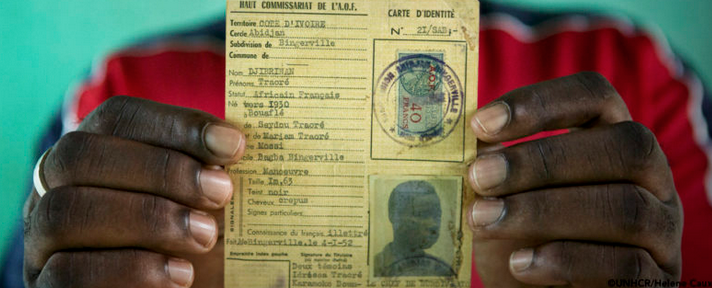The Social Life of Identity Papers in Africa (PIAF)
Richard Banégas (CERI) and Séverine Awenengo-Dalberto (CNRS-IMAf)
This project proposes to study the “governmentality of papers” in sub-Saharan Africa, from the post-war period to the current era of the global diffusion of biometric norms of identification. The starting point for this research is that many of the crises that contemporary African societies are going through are crises of citizenship involving legal and political supports for the recognition of rights among the first of which are “papers” (identity cards, voter cards, residence permits, passports, nationality certificates, land titles, certificates of ownership). Certain conflicts can even be read as “wars of identification” (Ivory Coast).
Societies’ accelerated biometricisation opens the way for an increasing securitisation of rights, but also produces new tensions around censuses and the issuing of titles and permits. The project thus interrogates the observable correlation between dispositifs of identification and political violence. But it is not limited to situations of conflict: on the contrary it intends to compare the usage of papers in situations of crisis and routine circumstances to analyse the ordinary relationships of citizens to the public sphere. The objective is to study practices of citizenship in action and the diffusion of bureaucratic rationality in societies reputed to be reluctant to it.
By addressing “papers” from a perspective of comparative historical sociology, the project aims to understand how material dispositifs of identification and assigning identity have, on the one hand, responded to a statist project to include, exclude, or control individuals and, on the other hand, permitted the emergence of new moral and political subjectivities. The objective of this programme is to restore the historicity and ambivalence of these processes, to explore the plurality of instances of documentary production and the complexity of relationships that individuals tie to these documents and institutions. Beyond an analysis of what we call “encartement” (the production of identity through documents) as a technology of power, it aims to make an account of the “social life of papers” to better understand, from below, ordinary practices of citizenship.
The programme rests on a comparative approach bringing together studies carried out in a dozen countries in sub-Saharan Africa: South Africa, Burkina Faso, Cameroon, Ivory Coast, Kenya, Mali, Mauritania, Nigeria, Uganda, Rwanda, Senegal, and Chad. The project mobilises two institutional partners in France (the Centre de Recherches Internationales [CERI, Centre for International Studies] at Sciences Po and the Institut des Mondes Africains [IMAF, African Worlds Institute]), as well as African university collaborations (including Wits University in Johannesburg) and 15 researchers, historians, political scientists, and anthropologists, specialising in questions of citizenship in their respective fields.
Identification and Citizenship in Africa. Presenting a Book and a Web Serie
In the context of a global biometric turn, the book presented here and in the web series (Identification and Citizenship in Africa. Biometrics, the Documentary State and Bureaucratic Writings of the Self, edited by Séverine Awenengo Dalberto and Richard Banégas (London, Routledge, 2021) investigates processes of identification in Africa “from below”, asking what this means for the relationship between citizens and the state.
Citoyens de papier en Afrique, numéro thématique de la revue Genèses, 2018/3 (n° 112)


















